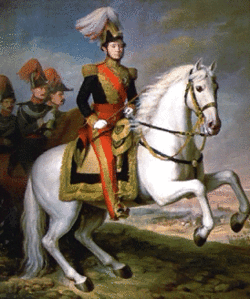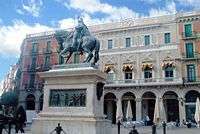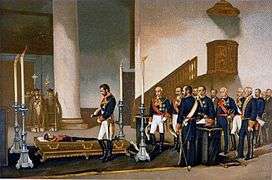Juan Prim, 1st Marquis of los Castillejos
| Juan Prim | |
|---|---|
|
Portrait by Luis Madrazo | |
| Prime Minister of Spain | |
|
In office 18 June 1868 – 27 December 1869 | |
| Monarch | Francisco Serrano y Domínguez |
| Preceded by | Francisco Serrano y Domínguez |
| Succeeded by | Juan Bautista Topete |
| Captain General of Puerto Rico | |
|
In office 1847–1848 | |
| Preceded by | Rafael de Aristegui y Velez |
| Succeeded by | Juan de la Pezuela y Cevallos |
| Personal details | |
| Born |
Juan Prim y Prats 12 December 1814 Reus, Spain |
| Died |
30 December 1870 (aged 56) Madrid, Spain |
| Nationality | Spanish |
| Profession | Politician |
| Signature |
|
| Military service | |
| Service/branch | Army |
| Years of service | 1834–1868 |
| Rank | General |
| Battles/wars |
Glorious Revolution First Carlist War Crimean War |
| Awards |
Laureate Cross of Saint Ferdinand (3) Order of the Medjidie |



Juan Prim y Prats, 1st Marquis of Los Castillejos, 1st Count of Reus, 1st Viscount of El Bruch, Grandee of Spain, (Spanish pronunciation: [ˈxwam ˈpɾin i ˈpɾats], Catalan: Joan Prim i Prats [ʒuˈam ˈpɾim i ˈpɾats]; 12 December 1814 – 30 December 1870) was a Spanish general and statesman who was briefly Prime Minister of Spain until his assassination.
Life
Prim was the son of lieutenant colonel Pablo Prim. He entered the free corps known as the volunteers of Isabella II in 1834, and in the course of the Carlist War he rose to the rank of lieutenant-colonel and had two orders of knighthood conferred upon him. After the pacification of 1839, as a progressist opposed to the dictatorship of General Espartero, he was sent into exile. However, in 1843 he was elected deputy for Tarragona, and after defeating Espartero at Bruch he entered Madrid in triumph with General Serrano. The regent Maria Christina promoted him major-general, and made him conde de Reus (Count of Reus) and vizconde del Bruch (Viscount of El Bruch).[1]
General Narváez, the prime minister, failed to understand what constitutional freedom meant, and General Prim, on showing signs of opposition, was sentenced to six years' imprisonment in the Philippine Islands. The sentence was not carried out, and Prim remained an exile in England and France until the amnesty of 1847. He then returned to Spain, and was first employed as captain-general of Puerto Rico (Governor of Puerto Rico) and afterwards as military representative with the sultan during the Crimean War. In 1854 he was elected to the cortes, and gave his support to General O'Donnell, who promoted him lieutenant-general in 1856. In the war with Morocco he did such good service at Castillejos (Fnideq), Cabo Negro, Guad al Gelu and Campamento in 1860 that he was made marqués de los Castillejos (Marquis of Los Castillejos) and Grande de España (Grandee of Spain).[1]
Prim commanded the Spanish army in Mexico when it refused to consent to the ambitious schemes of Napoleon III. On his return to Spain he joined the opposition, heading pronunciamentos in Catalonia against generals Narváez and O'Donnell. All his attempts failed until the death of Narváez in April 1868, after which Queen Isabella fell more and more under the influence of the Jesuits, and became increasingly tyrannical, until at last even Serrano was exiled. In September 1868 General Serrano and General Prim returned, and Brigadier Topete, commanding the fleet, raised the standard of revolt at Cádiz. In July 1869 General Serrano was elected regent, and Prim became president of the council and was made a marshal.

On 6 November 1870 Amadeo, Duke of Aosta, was elected king of Spain, but General Prim, on leaving the chamber of the Cortes on 28 December, was shot by unknown assassins and died two days later. The Cortes took his children as wards of the country; three days afterwards King Amadeo I swore in the presence of the corpse to observe the new Spanish constitution.[1] This is due to the fact that Prim had searched all the European courts of the time trying to find a monarch who was not opposed to being democratically elected. He is quoted for saying that "looking for a democratic monarch in Europe is like trying to find an atheist in heaven". Amadeo of Savoy was the most fitting that consented.
Notes
- 1 2 3 Chisholm 1911.
References
 Chisholm, Hugh, ed. (1911). "Prim, Juan". Encyclopædia Britannica (11th ed.). Cambridge University Press.
Chisholm, Hugh, ed. (1911). "Prim, Juan". Encyclopædia Britannica (11th ed.). Cambridge University Press.
Further reading
- Blairet, Louis (1867). Le Général Prim et la situation actuelle de l'Espagne. Paris.
- Guillaumot (1870). Juan Prim et l'Espagne. Paris.
- Guited, Gimenez y (1860). Guited, Historia militar y política del General Don Juan Prim. Barcelona.
- Léonardon, Henri (1901). Prim. Paris. (in French, contains a useful bibliography).
- Schurz, Carl (1907). "Chapter 6". Reminiscences. II. New York: McClure Publ. Co.,. pp. 293–297. (Schurz was the United States' ambassador to Spain in 1860. In his Reminiscences, he gives a short biography of Prim up to that time as well as his recollections of his own talks with Prim and the Spanish court).
External links
- Map (1866) of the approximate route of Prim from Ocaña to Portugal.
| Wikimedia Commons has media related to Juan Prim. |
| Preceded by Rafael De Aristegui y Velez |
Governor of Puerto Rico 1847-1848 |
Succeeded by Juan De La Pezuela y Cevallos |
| Preceded by Francisco Serrano y Domínguez, Duke de la Torre |
Prime Minister of Spain 1868-1869 |
Succeeded by Juan Bautista Topete y Carballo |
